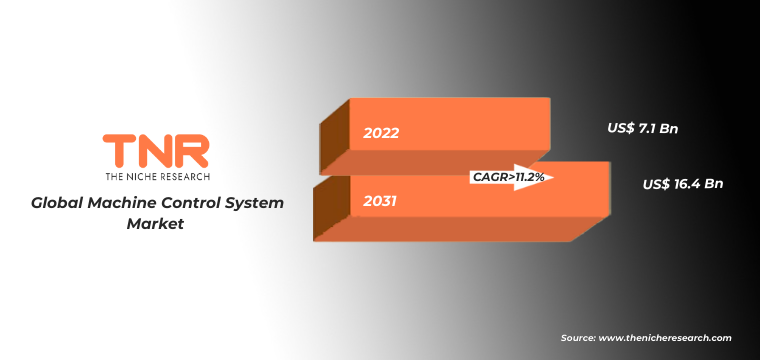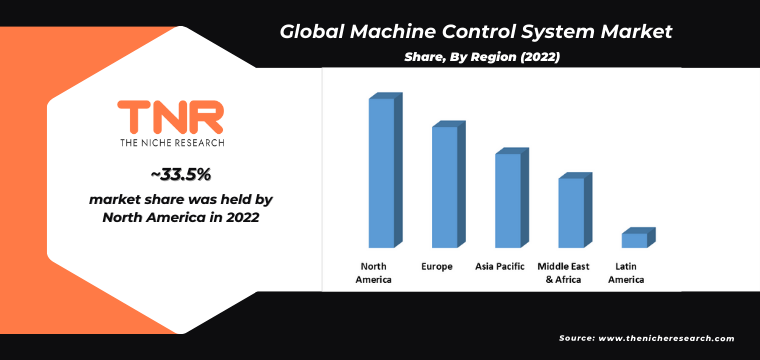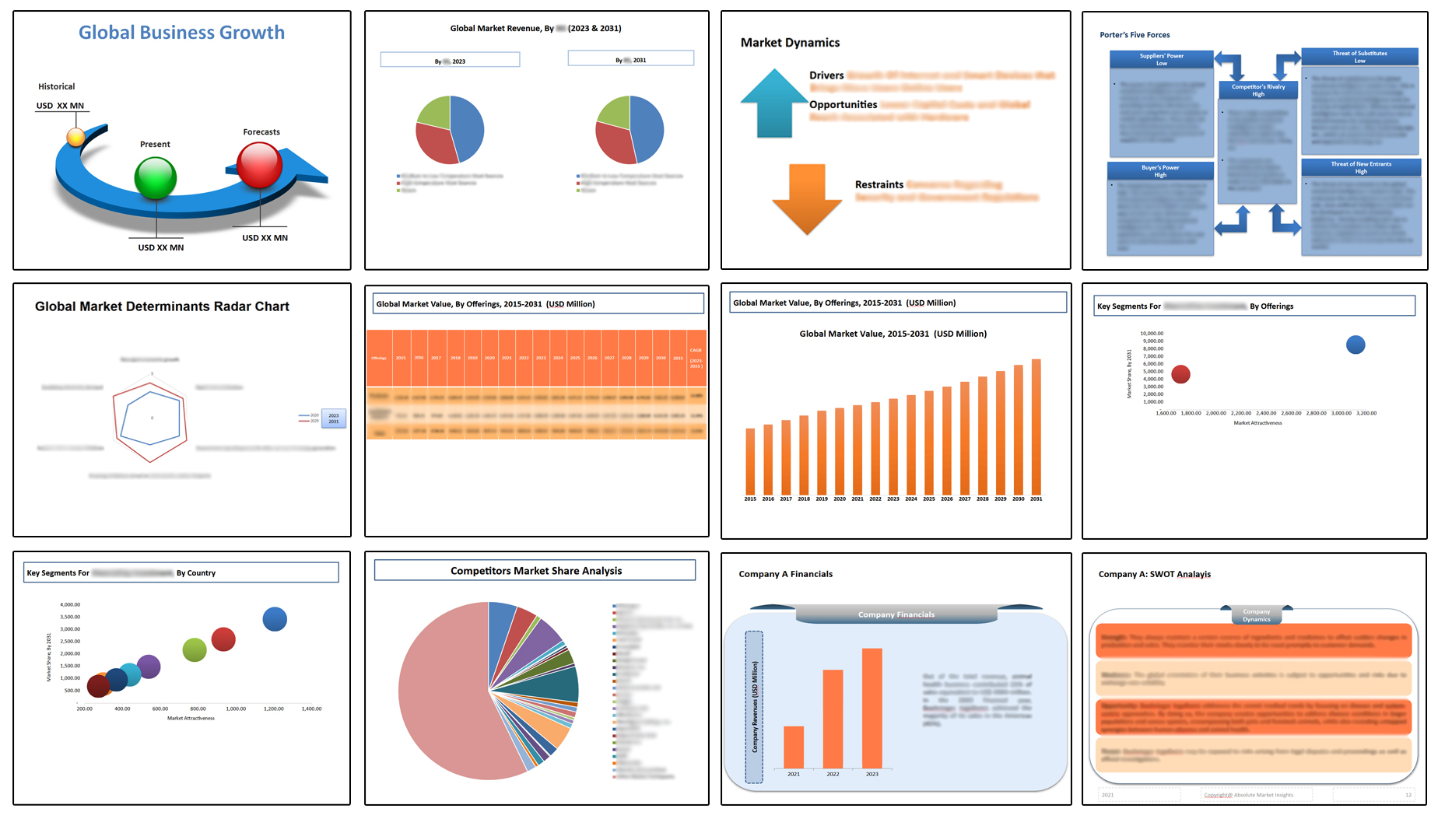Global Machine Control System Market By Offering, By Machine Type, By Control System Type, By Controller Type, By Industry Vertical & By Region: Industry Analysis; 2023 – 2031
- Industry: Construction & Manufacturing
- Report ID: TNR-110-1019
- Number of Pages: 420
- Table/Charts : Yes
- November, 2023
- Base Year : 2024
- No. of Companies : 15+
- No. of Countries : 29
- Views : 10206
- Covid Impact Covered: Yes
- War Impact Covered: Yes
- Formats : PDF, Excel, PPT
Global Machine Control System Market in 2022 was Worth USD 7.1 Bn and is Anticipated grow at 11.2% CAGR (2023-2031).
A machine control system (MCS) is a specialized control system used in manufacturing and industrial processes to automate and regulate the operation of machines and equipment. It is responsible for ensuring that machines perform their tasks accurately, efficiently, and safely. MCS typically combines hardware and software components to control various aspects of a machine or a production line.
Global Machine Control System Market Revenue & Forecast, (US$ Million), 2015 – 2031

Driver: Increasing Infrastructure Projects Driving Global Machine Control System Market Growth
- Growing Infrastructure Investments: Governments and private organizations worldwide have been increasing their investments in infrastructure development. This includes projects like road construction, bridges, tunnels, airports, railways, and utilities. These projects often require advanced machine control systems to ensure precision and efficiency in construction and maintenance.
- Demand for Efficiency and Precision: Infrastructure projects demand high levels of precision and efficiency to meet safety and quality standards. Machine control systems, including GPS-based solutions, allow construction equipment such as bulldozers, excavators, and graders to work with greater accuracy, reducing errors and rework.
- Cost Savings: Implementing machine control systems can lead to significant cost savings in infrastructure projects. By optimizing machine operations and reducing the need for manual labor, these systems help in minimizing project timelines and material wastage, upsurging machine control system market growth.
- Safety and Environmental Benefits: Machine control systems enhance the safety of construction sites by reducing the risk of accidents. They also contribute to environmental sustainability by minimizing the environmental impact of construction activities through more precise earthwork and materials usage.
- Rising Urbanization: The global trend towards urbanization is driving the need for infrastructure development in urban areas. This includes the construction of roads, bridges, and utilities to support growing populations, creating a steady demand for machine control system market.
Restraints: Requirement of High Initial Investment is likely to Hinder Global Machine Control System Market
- Capital Investment by End-Users: Companies that heavily rely on MCS, such as construction, mining, and agriculture, need to allocate a substantial portion of their capital budgets for the acquisition and integration of machine control systems. These investments cover the purchase of hardware (sensors, controllers, actuators), software, training, and installation.
- Market Entry Barriers: The high initial investment required to adopt MCS technology can act as a barrier to entry for smaller companies and startups. This can lead to machine control system market consolidation, with established players dominating the industry due to their financial resources.
- Return on Investment (ROI) Considerations: End-users evaluate the potential ROI of MCS investments. They assess factors like increased efficiency, reduced labor costs, improved quality, and project timelines. High initial investments can be justified by the long-term benefits, but businesses often conduct a thorough cost-benefit analysis.
- Competitive Advantages: Companies that invest in advanced MCS technology gain a competitive edge. They can bid on larger and more complex projects, complete tasks faster, and offer higher precision and quality. This competitive advantage can translate into increased market share and revenue.
- Financing Solutions: To address the issue of high initial investments, some companies offer financing options, leasing arrangements, or pay-per-use models, which can make it more affordable for end-users to adopt machine control system market.
Despite the high initial costs, the global machine control system market continues to grow due to increasing demand for automation, efficiency, and precision in various industries. Governments and organizations recognize the benefits of MCS in improving infrastructure, agriculture, and manufacturing, which drives continued investment.
Opportunities: Increase in Growth of Cordless Machine Control System Market
Cordless MCS offer greater mobility and flexibility compared to wired systems. They are ideal for applications where machines need to move freely or where the installation of wired connections is impractical. Eliminating the need for physical cables and connectors reduces installation and maintenance costs. This makes cordless MCS more cost-effective in the long run. In some applications, cordless MCS enhance safety by eliminating trip hazards associated with cables and reducing the risk of electrical accidents.
They are often more scalable, allowing businesses to easily expand or modify their setups without the constraints of physical wiring. The growth of cordless machine control system market is driven by the need for greater flexibility, reduced installation costs, and improved mobility in various industries. As technology continues to advance, cordless MCS are likely to become even more prevalent in automation and control applications.
Excavators Accounted for a Significant Market Share in 2022 in the Machine Control System Market, Particularly in the Construction and Mining Sector
MCS technology plays a crucial role in enhancing the efficiency and precision of excavators, and this has contributed to their prominence in the market. MCS-equipped excavators can optimize the use of materials and reduce the need for rework, resulting in cost savings for construction projects. They can dig to the correct depth and slope, minimizing over-excavation. Some MCS-equipped excavators offer remote control and semi-automation features.
This allows operators to control the machine from a safe distance or to execute repetitive tasks with precision. MCS technology in excavators can often be integrated with other construction equipment, such as bulldozers and graders, to ensure coordinated and accurate earthmoving operations on the construction site. Moreover, the precision and efficiency offered by MCS-equipped excavators can reduce the environmental impact of construction activities by minimizing soil disturbance and material wastage.
Asia-Pacific Region is Projected to Gain Fastest CAGR in the Machine Control System Market

Many countries in Asia-Pacific, including China, India, and Southeast Asian nations, were experiencing rapid urbanization and industrialization. This led to extensive infrastructure development projects, such as roads, bridges, airports, and utilities, all of which required advanced MCS technology for precision and efficiency. Asia-Pacific region has become a global manufacturing hub for various industries, including electronics, automotive, and textiles. Manufacturers in the region increasingly relied on MCS for automation, quality control, and cost-efficiency. Moreover, this region is at the forefront of adopting and innovating MCS technology. Local companies and global players were investing in research and development to create advanced solutions tailored to the region’s specific needs.
Competitive Landscape
Some of the players operating in the global machine control system market are:
- ANDRITZ
- Carlson Software
- Challenger Geomatics Ltd.
- Hemisphere GNSS, Inc.
- Hexagon AB
- James Fisher Technologies.
- Komatsu
- L5 Navigation Systems AB
- LIEBHERR
- MOBA MOBILE AUTOMATION AG
- RaptorTech.com
- RIB Group
- SATEL
- SITECH WEST.
- Topcon
- Trimble Inc.
- Other market participants
Global Machine Control System Market Report Coverage
| Report Specifications | Details |
| Market Revenue in 2022 | US$ 7.1 Billion |
| Market Size Forecast by 2031 | US$ 16.4 Billion |
| Growth Rate (CAGR) | 11.2% |
| Historic Data | 2015 – 2021 |
| Base Year for Estimation | 2022 |
| Forecast Period | 2023 – 2031 |
| Report Inclusions | Market Size & Estimates, Market Dynamics, Competitive Scenario, Trends, Growth Factors, Market Determinants, Key Investment Segmentation, Product/Service/Solutions Benchmarking |
| Segments Covered | By Offering, By Machine Type, By Control System Type, By Controller Type, By Industry Vertical |
| Regions Covered | North America, Europe, Asia Pacific, Middle East & Africa, Latin America |
| Countries Covered | U.S., Canada, Mexico, Rest of North America, France, The UK, Spain, Germany, Italy, Nordic Countries (Denmark, Finland, Iceland, Sweden, Norway), Benelux Union (Belgium, The Netherlands, Luxembourg), Rest of Europe, China, Japan, India, New Zealand, Australia, South Korea, Southeast Asia (Indonesia, Thailand, Malaysia, Singapore, Rest of Southeast Asia), Rest of Asia Pacific, Saudi Arabia, UAE, Egypt, Kuwait, South Africa, Rest of Middle East & Africa, Brazil, Argentina, Rest of Latin America |
| Key Players | ANDRITZ, Carlson Software, Challenger Geomatics Ltd., Hemisphere GNSS, Inc., Hexagon AB, James Fisher Technologies., Komatsu, L5 Navigation Systems AB, LIEBHERR, MOBA MOBILE AUTOMATION AG, RaptorTech.com, RIB Group, SATEL, SITECH WEST. , Topcon, Trimble Inc., Other Industry Participants |
| Customization Scope | Customization allows for the inclusion/modification of content pertaining to geographical regions, countries, and specific market segments. |
| Pricing & Procurement Options | Explore purchase options tailored to your specific research requirements |
| Contact Details | Consult With Our Expert
Japan (Toll-Free): – +81 663-386-8111 South Korea (Toll-Free): – +82-808- 703-126 Saudi Arabia (Toll-Free): – +966 800 850 1643 United States: +1 302-232-5106 United Kingdom: +447537105080 E-mail: askanexpert@thenicheresearh.com
|
Global Machine Control System Market
By Offering
- Hardware
-
- Displays
- Control Box
- Smart Antennas
- Base Stations
- Receiver
- Inertial Measurement Unit (IMU)
- Others
- Solutions
By Machine Type
- Dozers
- Motor Graders
- Excavators
- Drilling Machine
- Milling Machine
- Loaders
- Pavers
-
- Asphalt
- Concrete
- Scrapers
- Compactors
- Others
By Control System Type
- 2D
- 3D
By Controller Type
- Computer Numerical Control (CNC)
- Programmable Logic Controller (PLC)
- Programmable Automation Controller (PAC)
- Personal Computer (PC)
- Motion Controller
- Other
By Industry Vertical
- Construction
- Agriculture
- Mining
- Oil & Gas
- Automotive
- Marine
- Other
By Region
- North America (U.S., Canada, Mexico, Rest of North America)
- Europe (France, The UK, Spain, Germany, Italy, Nordic Countries (Denmark, Finland, Iceland, Sweden, Norway), Benelux Union (Belgium, The Netherlands, Luxembourg), Rest of Europe)
- Asia Pacific (China, Japan, India, New Zealand, Australia, South Korea, Southeast Asia (Indonesia, Thailand, Malaysia, Singapore, Rest of Southeast Asia), Rest of Asia Pacific)
- Middle East & Africa (Saudi Arabia, UAE, Egypt, Kuwait, South Africa, Rest of Middle East & Africa)
- Latin America (Brazil, Argentina, Rest of Latin America)
Report Coverage and Deliverables: LINK

Table of Contents
Note: This ToC is tentative and can be changed according to the research study conducted during the course of report completion.
**Exclusive for Multi-User and Enterprise User.
Global Machine Control System Market Segmentation
By Offering
By Machine Type
By Control System Type
By Controller Type
By Industry Vertical
By Region
**Note: The report covers cross-segmentation analysis by region further into countries
The Niche Research approach encompasses both primary and secondary research methods to provide comprehensive insights. While primary research is the cornerstone of our studies, we also incorporate secondary research sources such as company annual reports, premium industry databases, press releases, industry journals, and white papers.
Within our primary research, we actively engage with various industry stakeholders, conducting paid interviews and surveys. Our meticulous analysis extends to every market participant in major countries, allowing us to thoroughly examine their portfolios, calculate market shares, and segment revenues.
Our data collection primarily focuses on individual countries within our research scope, enabling us to estimate regional market sizes. Typically, we employ a bottom-up approach, meticulously tracking trends in different countries. We analyze growth drivers, constraints, technological innovations, and opportunities for each country, ultimately arriving at regional figures.Our process begins by examining the growth prospects of each country. Building upon these insights, we project growth and trends for the entire region. Finally, we utilize our proprietary model to refine estimations and forecasts.
Our data validation standards are integral to ensuring the reliability and accuracy of our research findings. Here’s a breakdown of our data validation processes and the stakeholders we engage with during our primary research:
- Supply Side Analysis: We initiate a supply side analysis by directly contacting market participants, through telephonic interviews and questionnaires containing both open-ended and close-ended questions. We gather information on their portfolios, segment revenues, developments, and growth strategies.
- Demand Side Analysis: To gain insights into adoption trends and consumer preferences, we reach out to target customers and users (non-vendors). This information forms a vital part of the qualitative analysis section of our reports, covering market dynamics, adoption trends, consumer behavior, spending patterns, and other related aspects.
- Consultant Insights: We tap into the expertise of our partner consultants from around the world to obtain their unique viewpoints and perspectives. Their insights contribute to a well-rounded understanding of the markets under investigation.
- In-House Validation: To ensure data accuracy and reliability, we conduct cross-validation of data points and information through our in-house team of consultants and utilize advanced data modeling tools for thorough verification.
The forecasts we provide are based on a comprehensive assessment of various factors, including:
- Market Trends and Past Performance (Last Five Years): We accurately analyze market trends and performance data from preceding five years to identify historical patterns and understand the market’s evolution.
- Historical Performance and Growth of Market Participants: We assess the historical performance and growth trajectories of key market participants. This analysis provides insights into the competitive landscape and individual company strategies.
- Market Determinants Impact Analysis (Next Eight Years): We conduct a rigorous analysis of the factors that are projected to influence the market over the next eight years. This includes assessing both internal and external determinants that can shape market dynamics.
- Drivers and Challenges for the Forecast Period:Identify the factors expected to drive market growth during the forecast period, as well as the challenges that the industry may face. This analysis aids in deriving an accurate growth rate projection.
- New Acquisitions, Collaborations, or Partnerships: We keep a close watch on any new acquisitions, collaborations, or partnerships within the industry. These developments can have a significant impact on market dynamics and competitiveness.
- Macro and Micro Factors Analysis:A thorough examination of both macro-level factors (e.g., economic trends, regulatory changes) and micro-level factors (e.g., technological advancements, consumer preferences) that may influence the market during the forecast period.
- End-User Sentiment Analysis: To understand the market from the end-user perspective, we conduct sentiment analysis. This involves assessing the sentiment, preferences, and feedback of the end-users, which can provide valuable insights into market trends.
- Perspective of Primary Participants: Insights gathered directly from primary research participants play a crucial role in shaping our forecasts. Their perspectives and experiences provide valuable qualitative data.
- Year-on-Year Growth Trend: We utilize a year-on-year growth trend based on historical market growth and expected future trends. This helps in formulating our growth projections, aligning them with the market’s historical performance.
Research process adopted by TNR involves multiple stages, including data collection, validation, quality checks, and presentation. It’s crucial that the data and information we provide add value to your existing market understanding and expertise. We have also established partnerships with business consulting, research, and survey organizations across regions and globally to collaborate on regional analysis and data validation, ensuring the highest level of accuracy and reliability in our reports.















